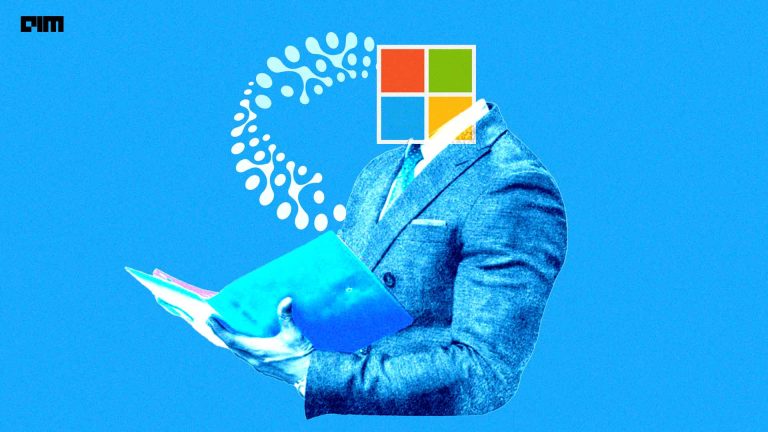|
Listen to this story
|
Microsoft annually spends over $1 billion on cybersecurity and uses AI/ML as a tool to effectively protect organisations and gain accurate insights for decision making. These applications are sailing tasks at Microsoft and Preeti’s idea isn’t too different.
In an exclusive conversation with Analytics India Magazine, Preeti Goel, Principal Engineering Manager at Microsoft shared her insight into the world of AI transforming the latest technologies.
AIM: Narrate a typical day of work as Principal Engineering Manager at Microsoft.
Preeti: A typical day at work involves a lot of meetings to help with decision-making, collaborating across teams, driving engineering design and discussions, and syncing with my team. I look into project priorities and timelines, track progress and unblock any decision-making bottlenecks. My strategy is to set focus blocks to work on emails, read design documents, code reviews, research new product ideas and focus on learning the latest technologies.
AIM: What are your prime roles vis-à-vis accomplishing future goals for the company?
Preeti: I lead teams in Microsoft Viva—which was one of the recent announcements made by Satya Nadella. It addresses collaboration, well-being and learning, and looks into what makes employees successful and productive while emphasising on privacy-protected insights and recommendations. Since this is a new product area, it gives me an opportunity to not just innovate but also invent and translate research and new ideas into product features.
AIM: Let’s talk about your AI/ML journey. What inspired you?
Preeti: I got interested in ML during my coursework in MTech (Computer Science) from IIT-Kanpur. The ability to use ML to make predictions or decisions by learning from data and its wide application to fields such as medicine, language processing, finance, and vision was immensely intriguing to me. Based on my interest, I pursued my master’s thesis to predict the optimal allocation of a mutual fund’s portfolio—depending on an individual’s risk appetite—using machine learning algorithms such as neural networks and genetic algorithms. Following this, I continued my work and journeyed through multiple roles at some of the world’s biggest companies; the latest being Google and Microsoft. It is inspiring to see how AI is transforming and impacting every sphere of our lives and is so strongly integrated with our day-to-day activities. It truly is transforming the way we live.
AIM: How do you approach an AI/ML problem and ensure that the work goes on smoothly? What are some of the challenges you face?
Preeti: AI is everywhere these days, APIs have democratised AI with applications in vision, hearing, reading—to name a few. It is critical for any organisation to understand if the business problem can be effectively solved with ML approaches, and then define the problem and success criteria. The next challenge is to understand the data and algorithms that can be applied to solve the business problem. Finally, organisations need to decide if they have security requirements and customisation needs which might require them to build the models in-house or if they can use MLaaS (Machine Learning as a Service) platforms by cloud providers such as Microsoft, Amazon, and Google.
AIM: Please share some of the learnings that come with this leadership position.
Preeti: Joining Microsoft remotely and working in Viva Insights has given me an opportunity to experience a new kind of world of work that is now transformed by the hybrid model. This experience has helped me develop new learnings and apply them to build actionable insights to empower employees, leaders, and managers. The company is currently investing significantly in building the next-generation employee experience cloud which caters to the new post-pandemic world, where employees are working remotely. One of the biggest challenges that companies are facing today is being able to measure employee well-being and productivity. My learnings have taught me that being open, reaching out, and the loop of “communicate, clarify, repeat” works for me to learn faster about products and people.
AIM: Did you encounter ‘glass ceiling’ on your way to becoming the Principal Engineering Manager? How has Microsoft helped you in your AI journey?
Preeti: I have been fortunate enough to have not encountered this barrier. This is in large part due to Microsoft’s focus on having more women in leadership roles and their commitment towards diversity. Having said that, I fully acknowledge that there is a real problem with women’s representation; there are less than 20% women in higher leadership and C-suite positions. I have always been a strong advocate of diversity and inclusion (D&I) and contribute actively to organisation-wide D&I initiatives and Technical Women groups. As a leader, I strive to build psychologically safe and inclusive work environments and ensure that minorities have a voice and are well represented. I am also invested in incorporating inclusivity in the product, where we build inclusive and well-being insights for managers and leaders.
My current role in Microsoft Viva Insights gives me a lot of scope for ideating, incubating research, and incorporating them into the product. This includes new ideas and AI/ML work in organisational network analysis and building meeting effectiveness insights.
AIM: What can organisations do with AI/ML, and how do you see the industry evolve in the next five years?
Preeti: AI is more than ML. ML is an application of AI which is how a computer builds its intelligence based on experience (learning from data through models). The biggest challenge for organisations in the next 3–5 years is to educate and demystify artificial intelligence and ensure fairness. There are distorted views of AI and the challenges of infallibility that come with it. There is also an assumption of unbiasedness and neutrality, where people think that since it is a computer, it is impartial (such as search results or NLP-based systems). However, since the systems learn from human data, they face the same bias as regular human behaviour.
Furthermore, advances in machine learning, access to large-scale computing, richer data sets and Machine Learning as a Service (MLaaS) have amplified privacy concerns in ML model deployments. For instance, there have been membership inference attacks, where models leak information about the individual data records on which they were trained. There is also research on training data extraction, due to models encoding PIIs and memorising training data. Data privacy laws, regulations, and issues crop up when an organisation wants to share, collect or publish private data of individuals while simultaneously wanting to protect their personally identifiable information (PII). Machine learning modelling also needs to align with local and international laws such as GDPR, CCPA, and the European AI policy on trustworthy AI.
AIM: You were the judge for Stevie Awards For Women in Business. Could you tell us more about that?
Preeti: I have activities contributing back to the technical and academic community by reviewing research and judging technical industry award platforms such as the Stevie Awards. Recently, I judged the Stevie Women Executive Awards. It is one of the world’s most coveted awards recognising individual women entrepreneurs, executives, and employees. I am also on the judging panel for Globee Women World Awards and Excellence in Tech Awards for Brandon Hall Group.
AIM: How can organisations address gender inequality at the workplace? According to you, what measures can be taken to resolve this issue?
Preeti: Gender representation is an issue in tech not just at the organisational level but also further up the funnel in educational institutions as well. Whether we look at premier Indian institutes such as the IITs, where traditionally, the women-to-men ratio has been nearly 10%, or, the gender gap in the world of work, which is even more exacerbated in STEM-related fields. In fact, in the US, this ratio is about 27%. According to me, encouraging women to take up STEM education through programmes in schools and showing them that girls can code is the first step towards achieving some semblance of parity. At the organisational level, there are multiple initiatives to address gender inequality, such as equal pay and representation of women at all levels, including senior leadership and C-suite.


















































































